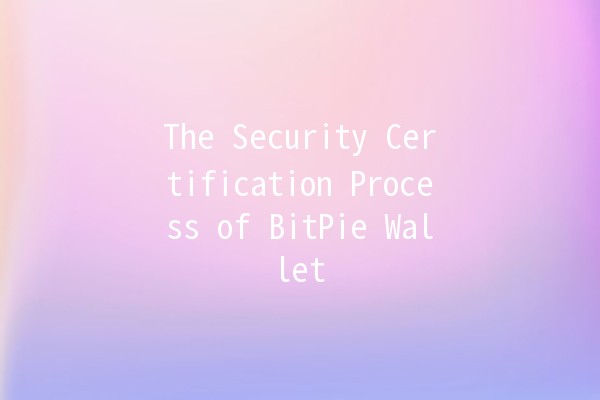
In the fastevolving world of cryptocurrencies, ensuring your digital assets are secure is more crucial than ever. BitPie Wallet, a popular wallet solution, is known for its robust security protocols that help safeguard users' funds and personal information. This article delves into the security certification process of BitPie Wallet, covering various aspects associated with its security features, the implementation of industry standards, and practical tips for maximizing security.
Understanding the Importance of Security in Digital Wallets
With the rise in cybercrime, understanding security protocols for cryptocurrency wallets is paramount. Digital wallets like BitPie often hold significant amounts of assets, making them prime targets for hackers. The security certification process not only instills trust among users but also helps to create a more secure environment for the broader cryptocurrency ecosystem.
Why Security Certification Matters
Security certification serves several important functions:

Building Trust: Users are more likely to utilize a wallet that has undergone rigorous security testing and certification.
Compliance with Standards: Adhering to international security standards showcases a commitment to maintaining high security levels.
Reducing Vulnerabilities: Certification processes often identify potential vulnerabilities and enforce strategies for mitigation.
The Security Certification Process of BitPie Wallet
The security certification process for BitPie Wallet involves different stages, focusing on various aspects that affect the overall security protocol. Let's break down this process.
Vulnerability assessment is a systematic review of security weaknesses in the wallet's design and implementation. BitPie undergoes regular penetration testing, where ethical hackers attempt to exploit vulnerabilities to access the system.
Practical Application:
Conduct Routine Testing: It’s beneficial for users and developers to conduct penetration testing regularly to stay updated on potential threats.
Implement Bug Bounty Programs: Engaging ethical hackers through bug bounty programs can further enhance security measures, leveraging a broader community to identify vulnerabilities.
BitPie Wallet strives to comply with internationally recognized security standards such as ISO/IEC 27001, which outlines requirements for an information security management system (ISMS). Compliance with these standards establishes a framework for risk management and data security.
Practical Application:
Educate Users on Standards: Inform users about the importance of these standards and how they help ensure data security.
Continuous Improvement: Regularly update the wallet to comply with new standards as they emerge.
Multifactor authentication adds an additional layer of security beyond just a password–typically requiring something the user knows (a password) and something the user has (a verification code sent to their phone).
Practical Application:
Always Enable MFA: Encourage users to activate MFA for an added layer of security on their accounts.
HD Wallets: Educate users on the benefits of Hierarchical Deterministic (HD) wallets, which can enhance security by allowing users to generate new addresses for each transaction.
BitPie employs cold storage wallets, which are offline and thus less susceptible to online attacks. These wallets store a majority of users' cryptocurrency assets in an offline environment, ensuring added protection.
Practical Application:
Users Should Consider Cold Storage: For longterm holdings, advise users to consider transferring their assets to a cold storage solution or hardware wallet.
Educate About Safe Practices: Provide information on how to securely set up and manage a cold wallet.
Software vulnerabilities can expose wallets to risks. BitPie regularly updates its software to address any known vulnerabilities and apply security patches.
Practical Application:
Enable AutoUpdates: Encourage users to enable automatic updates on their wallets to ensure they benefit from the latest security patches.
Stay Informed About Updates: Maintain transparency around updates by informing users about what each update addresses.
Enhancing Security PostCertification
Even after certification, BitPie continually updates its security protocols. Here are some additional strategies users can apply to enhance their wallet's security:
Creating a strong password that combines letters, numbers, and symbols enhances account security.
Password Managers: Recommend using password managers to help generate and store strong passwords.
Phishing attacks target users by masquerading as legitimate services. Users should always verify communications and links related to their wallets.
Email Verification: Encouraging users to check the sender's email address can help prevent falling for phishing scams.
Keep an eye on transaction history and report any suspicious activity immediately.
Set Up Alerts: Users can set up alerts for any transactions made from their account to catch unauthorized transactions quickly.
Awareness of the latest security practices can significantly reduce risks.
Engage in Community Knowledge Sharing: By participating in forums, users can remain updated on new security threats and how to counter them.
Restricting device access to the wallet minimizes the risk of unauthorized access.
Device Management: Advise users to manage devices authorized to access their wallet actively.
Common Questions About BitPie Wallet's Security
BitPie uses a combination of cold storage, strong encryption, and multifactor authentication to protect user funds. This layered security approach helps minimize risks associated with online vulnerabilities.
If you suspect unauthorized access, change your password immediately and enable multifactor authentication. Additionally, monitor your account activity closely for any suspicious transactions.
BitPie regularly evaluates and updates its security protocols in response to new threats and vulnerabilities, ensuring users benefit from stateoftheart security measures.
BitPie provides recovery options such as seed phrases upon wallet creation. It's essential to store these recovery phrases securely in case you lose access.
Using wallets on public WiFi is not advisable, as these networks can be susceptible to attacks. Use a secure, private network whenever possible.
Before transferring assets, ensure your device is secure, use strong passwords, and doublecheck the wallet address to which you are sending funds to prevent errors.
The security certification process for BitPie Wallet plays a pivotal role in protecting users’ cryptocurrency assets. By understanding and following the outlined security measures, you can maximize the protection of your digital wealth. Remaining vigilant and uptodate with security practices is essential, not just for BitPie users, but for everyone involved in the cryptocurrency ecosystem.

